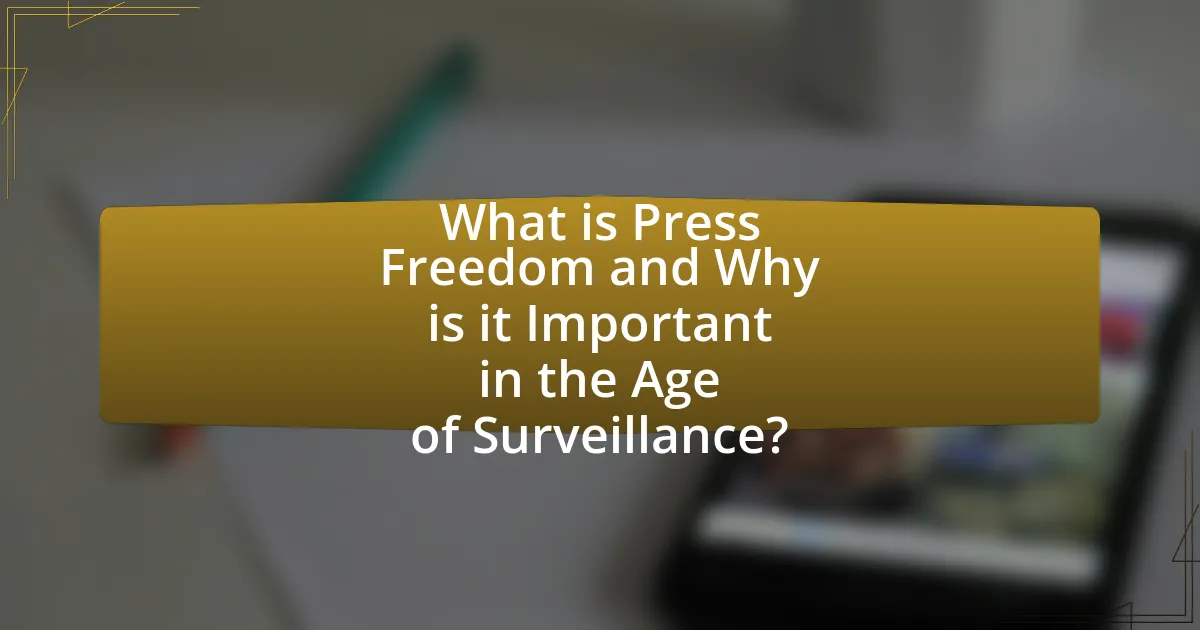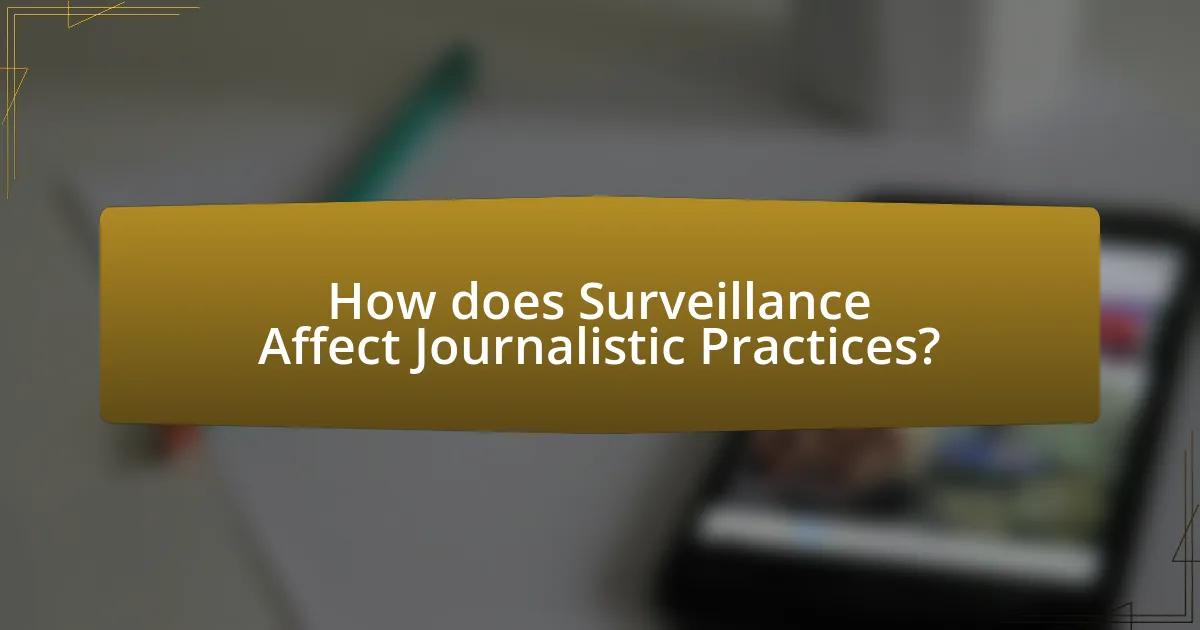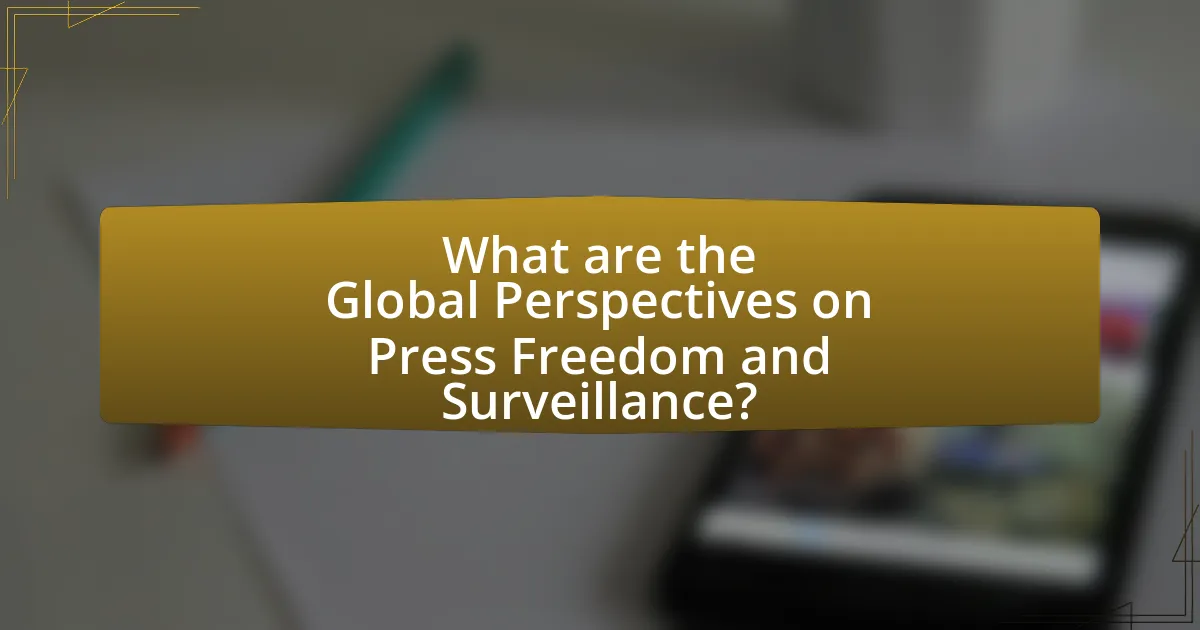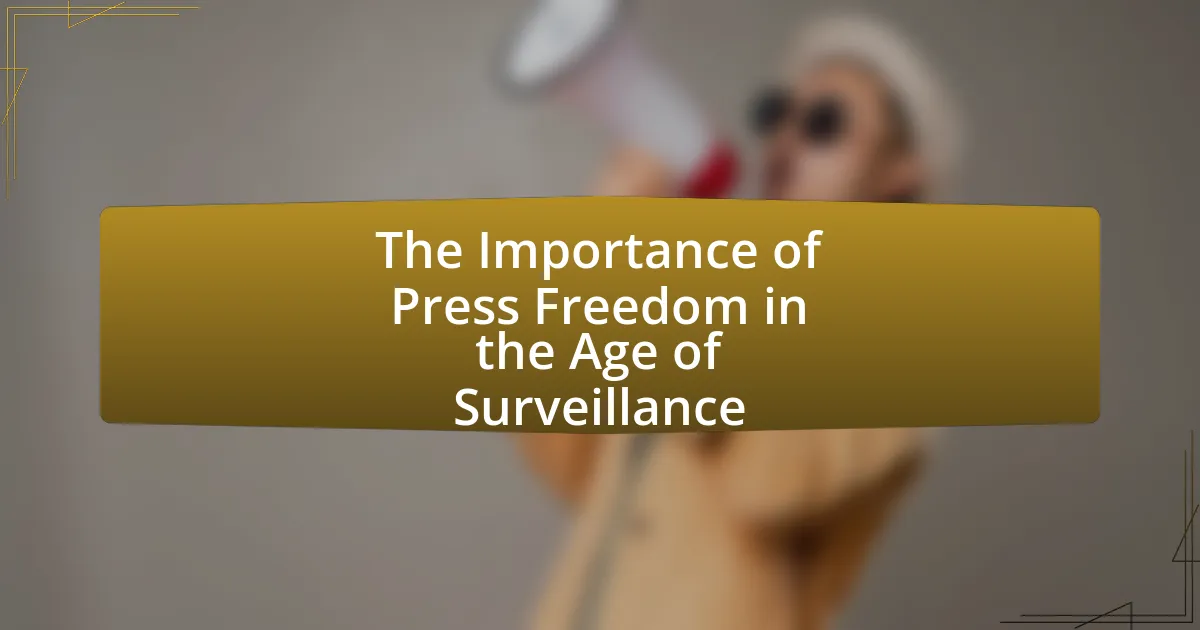Press freedom is defined as the right of journalists and media organizations to report news and express opinions without government censorship or restraint. This article examines the critical importance of press freedom in the context of increasing surveillance, highlighting its role in promoting democracy, holding power accountable, and fostering public discourse. It discusses the challenges faced by journalists in a surveillance society, including self-censorship and threats to their safety, and explores the implications of data privacy concerns on journalistic practices. Additionally, the article reviews global perspectives on press freedom, the effectiveness of international laws, and the actions individuals can take to support and advocate for press freedom in an era marked by surveillance.

What is Press Freedom and Why is it Important in the Age of Surveillance?
Press freedom is the right of journalists and media organizations to report news and express opinions without censorship or restraint from the government or other entities. In the age of surveillance, press freedom is crucial because it enables the media to investigate and expose abuses of power, including government overreach and violations of civil liberties. For instance, the 2013 revelations by Edward Snowden highlighted extensive government surveillance programs, underscoring the need for a free press to inform the public and hold authorities accountable. Without press freedom, the ability to challenge and scrutinize such practices diminishes, leading to a less informed society and potential erosion of democratic values.
How does press freedom contribute to democracy?
Press freedom contributes to democracy by enabling the dissemination of information, fostering public debate, and holding power accountable. A free press serves as a watchdog, exposing corruption and abuses of power, which is essential for informed citizen participation in democratic processes. For instance, the Watergate scandal, uncovered by investigative journalism, led to significant political reforms in the United States. Furthermore, according to the World Press Freedom Index, countries with higher press freedom scores tend to have stronger democratic institutions and greater civic engagement, illustrating the direct correlation between press freedom and the health of democracy.
What role does press freedom play in holding power accountable?
Press freedom plays a crucial role in holding power accountable by enabling journalists to investigate and report on government actions and policies without fear of censorship or retaliation. This independence allows the media to expose corruption, abuse of power, and violations of rights, thereby fostering transparency and informing the public. For instance, the Watergate scandal, uncovered by journalists from The Washington Post, led to the resignation of President Nixon, demonstrating how press freedom can directly influence political accountability. Furthermore, according to the World Press Freedom Index, countries with higher levels of press freedom tend to have lower levels of corruption, reinforcing the idea that a free press is essential for a functioning democracy and accountability in governance.
How does press freedom foster public discourse and informed citizenry?
Press freedom fosters public discourse and informed citizenry by enabling diverse viewpoints and facilitating open dialogue. When the press operates without censorship, it can investigate, report, and disseminate information on various issues, allowing citizens to engage in discussions based on accurate and comprehensive data. For instance, studies show that countries with higher press freedom scores, such as Norway and Sweden, exhibit greater levels of civic engagement and public participation in democratic processes. This correlation underscores the role of an independent press in empowering individuals to make informed decisions and contribute meaningfully to societal debates.
What are the challenges to press freedom in a surveillance society?
Press freedom faces significant challenges in a surveillance society, primarily due to government monitoring and the chilling effect on journalists. Surveillance can lead to self-censorship among reporters who fear repercussions for their work, as evidenced by the decline in investigative journalism in countries with high surveillance levels, such as China and Russia. Additionally, the collection of data on journalists and their sources can undermine the confidentiality necessary for investigative reporting, as seen in cases where whistleblowers are deterred from coming forward due to fear of exposure. These factors collectively threaten the ability of the press to operate independently and hold power accountable.
How does government surveillance impact journalists and their sources?
Government surveillance significantly impacts journalists and their sources by creating an environment of fear and self-censorship. Journalists may hesitate to pursue sensitive stories or protect their sources due to the risk of being monitored, which can lead to a chilling effect on investigative reporting. For instance, a 2013 report by the Committee to Protect Journalists highlighted that surveillance practices can deter whistleblowers from coming forward, fearing exposure and retaliation. This undermines the ability of the press to hold power accountable and diminishes the public’s access to vital information.
What are the implications of data privacy concerns for press freedom?
Data privacy concerns significantly threaten press freedom by creating an environment of self-censorship among journalists. When reporters fear that their communications and sources may be monitored, they may hesitate to investigate sensitive topics or expose wrongdoing, which undermines the public’s right to know. For instance, the 2013 revelations by Edward Snowden highlighted how government surveillance programs could compromise journalistic sources, leading to a chilling effect on investigative reporting. This dynamic illustrates that when journalists are unable to operate without fear of surveillance, the quality and quantity of information available to the public diminish, ultimately weakening democratic accountability.

How does Surveillance Affect Journalistic Practices?
Surveillance significantly impacts journalistic practices by creating an environment of self-censorship and fear among journalists. When journalists know they are being monitored, they may hesitate to pursue sensitive stories or communicate with sources, fearing repercussions. A study by the Committee to Protect Journalists found that 70% of journalists reported feeling less secure in their work due to surveillance, which directly affects their ability to report freely and accurately. This chilling effect undermines the fundamental principles of press freedom, as journalists may avoid covering critical issues that require investigative reporting.
What are the risks journalists face in a surveillance environment?
Journalists face significant risks in a surveillance environment, including threats to their safety, compromised sources, and diminished press freedom. Surveillance can lead to physical harm, as journalists may be targeted by state actors or hostile entities seeking to silence dissent. Additionally, the monitoring of communications can expose confidential sources, deterring whistleblowers and compromising investigative reporting. A report by the Committee to Protect Journalists highlights that increased surveillance correlates with a rise in harassment and intimidation of journalists, undermining their ability to operate freely and effectively.
How can surveillance lead to self-censorship among journalists?
Surveillance can lead to self-censorship among journalists by instilling fear of repercussions for their reporting. When journalists are aware that their communications and activities are being monitored, they may alter their content or avoid sensitive topics to protect themselves from potential legal or professional consequences. Research by the Committee to Protect Journalists indicates that in environments with high surveillance, journalists often self-censor to avoid harassment or retaliation, which undermines the integrity of press freedom. This dynamic creates a chilling effect, where the fear of surveillance stifles open discourse and critical reporting, ultimately harming the public’s right to information.
What measures can journalists take to protect their sources from surveillance?
Journalists can protect their sources from surveillance by employing secure communication methods, such as encrypted messaging apps like Signal or WhatsApp, which utilize end-to-end encryption to ensure that conversations remain private. Additionally, journalists should avoid discussing sensitive information over unsecured channels, including regular email or phone calls, as these can be easily intercepted.
Using secure devices and regularly updating software to patch vulnerabilities also enhances protection against surveillance. Furthermore, journalists can anonymize their online presence by using Virtual Private Networks (VPNs) and Tor browsers, which help mask their IP addresses and browsing activities.
Research indicates that the use of encryption can significantly reduce the risk of unauthorized access to communications, as highlighted in the 2016 report by the Electronic Frontier Foundation, which emphasizes the importance of digital security for journalists.
How does technology influence press freedom in the context of surveillance?
Technology significantly influences press freedom in the context of surveillance by enabling both the monitoring of journalists and the dissemination of information. Surveillance technologies, such as data collection and monitoring tools, can intimidate journalists, leading to self-censorship and a chilling effect on reporting. For instance, the use of advanced surveillance systems by governments has been documented to track journalists’ communications, as seen in cases like the Pegasus spyware scandal, where journalists were targeted to suppress dissenting voices. This environment of fear undermines the ability of the press to operate freely and hold power accountable, ultimately threatening democratic processes and public discourse.
What tools are available for journalists to safeguard their communications?
Journalists can use several tools to safeguard their communications, including encrypted messaging apps like Signal and WhatsApp, secure email services such as ProtonMail, and virtual private networks (VPNs) for anonymous browsing. These tools provide end-to-end encryption, ensuring that only the intended recipients can read the messages, thereby protecting sensitive information from surveillance. For instance, Signal uses strong encryption protocols that have been independently audited, making it a reliable choice for secure communication. Additionally, using a VPN can mask a journalist’s IP address, further enhancing their privacy while accessing the internet.
How can technology both hinder and enhance press freedom?
Technology can both hinder and enhance press freedom by providing tools for dissemination and surveillance. On one hand, technology facilitates the rapid spread of information through social media and online platforms, allowing journalists to reach wider audiences and share critical news instantly. For example, during the Arab Spring, social media played a crucial role in mobilizing protests and disseminating information that challenged authoritarian regimes. On the other hand, technology can hinder press freedom through increased surveillance and censorship. Governments can monitor journalists and their communications, as seen in cases like the hacking of the phones of journalists by state actors, which creates a chilling effect on reporting. The dual nature of technology thus presents both opportunities for enhanced communication and significant risks to the safety and autonomy of the press.

What are the Global Perspectives on Press Freedom and Surveillance?
Global perspectives on press freedom and surveillance reveal a complex interplay between the two, with significant variations across different regions. In democratic nations, press freedom is often protected by law, yet surveillance practices, such as those revealed by Edward Snowden in 2013, raise concerns about the chilling effects on journalistic activities. For instance, the Freedom House report in 2022 indicated that countries like the United States and Canada face challenges where surveillance technologies can undermine press freedom by instilling fear among journalists. Conversely, in authoritarian regimes, such as China and Russia, press freedom is severely restricted, and surveillance is extensively used to monitor and control media narratives, as documented in the 2021 Reporters Without Borders World Press Freedom Index. This index highlights that in these countries, the state employs advanced surveillance techniques to suppress dissent and manipulate public opinion, demonstrating a direct correlation between limited press freedom and heightened surveillance measures.
How do different countries approach press freedom in the face of surveillance?
Different countries exhibit varied approaches to press freedom amid surveillance, often influenced by their political systems and legal frameworks. For instance, in democratic nations like Germany and Canada, laws protect journalistic sources and promote transparency, allowing for a more robust press environment despite surveillance concerns. Conversely, authoritarian regimes such as China and Russia impose strict controls on media, limiting press freedom and using surveillance to suppress dissent and monitor journalists. According to the 2023 World Press Freedom Index, countries with high surveillance levels often correlate with lower press freedom rankings, highlighting the detrimental impact of surveillance on journalistic independence.
What examples exist of countries that have successfully protected press freedom?
Countries that have successfully protected press freedom include Norway, Finland, and Sweden. Norway consistently ranks at the top of the World Press Freedom Index, demonstrating strong legal protections for journalists and a culture that values media independence. Finland also ranks highly, with robust laws safeguarding freedom of expression and a transparent government that fosters a free press. Sweden, known for its Freedom of the Press Act, has a long-standing commitment to press freedom, ensuring that journalists can operate without fear of censorship or retaliation. These countries exemplify effective measures and cultural attitudes that support and protect press freedom.
How do authoritarian regimes utilize surveillance to suppress press freedom?
Authoritarian regimes utilize surveillance to suppress press freedom by monitoring journalists and media outlets, thereby instilling fear and self-censorship. These regimes often employ advanced technologies, such as internet monitoring and data collection, to track the activities and communications of reporters, which discourages them from publishing dissenting views. For instance, in countries like China, the government uses extensive surveillance systems to monitor online activities, leading to a significant decline in investigative journalism and critical reporting. This systematic approach to surveillance not only targets individual journalists but also creates a broader chilling effect on the media landscape, ultimately undermining the fundamental principles of press freedom.
What international laws and agreements support press freedom?
International laws and agreements that support press freedom include the Universal Declaration of Human Rights (UDHR), specifically Article 19, which asserts the right to freedom of opinion and expression. Additionally, the International Covenant on Civil and Political Rights (ICCPR) reinforces this right in Article 19, emphasizing the importance of free expression for democratic societies. The European Convention on Human Rights (ECHR), particularly Article 10, also protects the freedom of expression, which encompasses press freedom. These documents collectively establish a global framework that recognizes and promotes the essential role of a free press in fostering transparency and accountability in governance.
How effective are these laws in protecting journalists from surveillance abuses?
The effectiveness of laws protecting journalists from surveillance abuses varies significantly by jurisdiction and enforcement. In countries with robust legal frameworks, such as the United States, laws like the First Amendment and the Privacy Protection Act provide substantial protections against unlawful surveillance. However, in practice, these protections can be undermined by exceptions, such as national security concerns, which have been invoked to justify surveillance activities against journalists. For instance, a 2021 report by the Committee to Protect Journalists highlighted that in many countries, including those with strong legal protections, journalists still face significant risks of surveillance, indicating that legal frameworks alone are insufficient without proper enforcement and accountability measures.
What role do international organizations play in advocating for press freedom?
International organizations play a crucial role in advocating for press freedom by monitoring violations, providing support to journalists, and promoting international standards. Organizations such as Reporters Without Borders and the Committee to Protect Journalists actively document instances of press suppression and issue reports that raise global awareness. For example, Reporters Without Borders publishes the World Press Freedom Index, which ranks countries based on their press freedom levels, thereby influencing public opinion and policy. Additionally, these organizations often engage in lobbying efforts at international forums, urging governments to uphold press freedom as a fundamental human right, as outlined in Article 19 of the Universal Declaration of Human Rights. Their advocacy efforts contribute to a global dialogue on the importance of safeguarding journalistic independence, especially in an era marked by increasing surveillance and censorship.
What can individuals do to support press freedom in the age of surveillance?
Individuals can support press freedom in the age of surveillance by advocating for stronger privacy protections and supporting independent media organizations. Advocacy for legislation that limits government surveillance, such as the USA Freedom Act, can help protect journalists and their sources from unwarranted monitoring. Supporting independent media through subscriptions or donations ensures that diverse voices remain operational despite financial pressures. Additionally, individuals can educate themselves and others about the importance of press freedom, as informed citizens are more likely to defend it. Engaging in campaigns that promote digital security practices, such as using encrypted communication tools, further protects journalists from surveillance threats.
How can citizens advocate for stronger protections for journalists?
Citizens can advocate for stronger protections for journalists by engaging in grassroots campaigns, lobbying for legislative changes, and raising public awareness about the importance of press freedom. Grassroots campaigns can mobilize community support, while lobbying efforts can directly influence policymakers to enact laws that safeguard journalists’ rights. Public awareness initiatives, such as social media campaigns and educational programs, can highlight the risks journalists face and the vital role they play in democracy. According to the Committee to Protect Journalists, countries with strong legal protections for journalists experience lower rates of violence against them, underscoring the effectiveness of advocacy in creating safer environments for media professionals.
What actions can individuals take to promote media literacy and awareness?
Individuals can promote media literacy and awareness by actively engaging in critical evaluation of information sources. This involves assessing the credibility of news outlets, verifying facts through multiple reliable sources, and recognizing biases in reporting. Research indicates that media literacy education can significantly enhance individuals’ ability to discern misinformation; for instance, a study by the Stanford History Education Group found that 96% of high school students could not distinguish between a sponsored post and a news article. By participating in workshops, sharing educational resources, and discussing media content with peers, individuals can foster a more informed community capable of navigating the complexities of modern media landscapes.

Leave a Reply